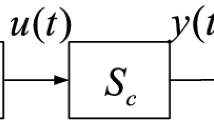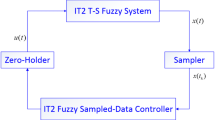Abstract
The studying motivation of this paper is that there exist many modeling issues of non-uniformly sampling nonlinear systems in industrial systems. Based on multi-model modeling principle, the corresponding model of non-uniformly sampling nonlinear systems is described by the nonlinear weighted combination of some linear models at local working points. Fuzzy modeling based on multimodel scheme is a common method to describe the dynamic process of non-linear systems. In this paper, the fuzzy modeling method of non-uniformly sampling nonlinear systems is studied. The premise structure of the fuzzy model is confirmed by GK fuzzy clustering, and the conclusion parameters of the fuzzy model are estimated by the recursive least squared algorithm. The convergence perfromance of the proposed identification algorithm is given by using lemmas and martingale theorem. Finally, the simulation example is given to demonstrate the effectiveness of the proposed method.
Similar content being viewed by others
References
Ding F, Qiu L, and Chen T, Reconstruction of continuous-time systems from their non-uniformly sampled discrete-time systems, Automatica, 2009, 45(2): 324–332.
Li W, Shah S L, and Xiao D, Kalman filters in non-uniformly sampled multirate systems: For FDI and beyond, Automatica, 2008, 44(1): 199–208.
Ding F, Liu G L, and Liu X P, Parameter estimation with scarce measurements, Automatica, 2011, 47(3): 1646–1655.
Ding F and Chen T, Hierarchical least squares identification methods for multivariable systems, IEEE Trans. Circuits Syst. I, 2005, 52(6): 1179–1187.
Ding F and Chen T, Hierarchical identification of lifted state-space models for general dual-rate systems, IEEE Trans. Autom. Control, 2005, 50(3): 397–402.
Larsson E K and Derstro M S, Identification of continuous time AR processes from unevenly sampled data, Automatica, 2002, 38(2): 709–718.
Larsson E K, Mossberg M, and Derstro M S, Identification of continuous-time ARX models from irregularly sampled data, IEEE Trans. Autom. Control, 2007, 52(3): 417–426.
Sanchis R and Albertos P, Recursive identification under scarce measurements-convergence analysis, Automatica, 2002, 38(3): 909–918.
Kanniah J, Malik O P, and Hope G S, Self-tuning regulator based on dual-rate sampling, IEEE Transactions on Automatic Control, 1984, 29(8): 755–759.
Kumar M, Stoll R, and Stoll N, A robust design criterion for interpretable fuzzy models with uncertain data, IEEE Transactions Fuzzy Systems, 2006, 14(2): 314–328.
Kumar M, Stoll R, and Stoll N, An energy-gain bounding approach to robust fuzzy identification, Automatica, 2006, 42: 711–721.
Venkat A N, Vijaysai P, and Gudi R D, dentification of complex nonlinear processes based on fuzzy decomposition of the steady state space, Journal of Process Control, 2003, 13: 473–488.
Babuka R and Verbruggen H, Neuro-fuzzy methods for nonlinear system identification, Annual Reviews in Control, 2003, 27: 73–85.
Kim E, Park M, Kim S, et al., A transformed input-domain approach to fuzzy modeling, IEEE Transaction on Fuzzy Systems, 1998, 6(4): 596–603.
Gustafson D E and Kessel W C, Fuzzy clustering with a fuzzy convariance matrix, Conference of Control and Decision, San Diego, 1979, 761–766.
Setnes M, Supervised fuzzy clustering for rules extraction, IEEE Transaction on Fuzzy Systems, 2000, 8(4): 416–424.
Goodwin G C and Sin K S, Adaptive Filtering Prediction and Control, Prentice-Hall, Englewood Cliffs, NJ, 1984.
Ding F, Systems Identification-Performance Analysis of the Identification Methods, Science Press in China, Beijing, 2014.
Ding F, New Theory of System Identification, Science Press in China, Beijing, 2013.
Xie X M and Ding F, Adaptive Control System, Tsinghua University Press, Beijing, 2002.
Author information
Authors and Affiliations
Corresponding author
Additional information
The research was supported by the National Natural Science Foundation of China under Grant Nos. 61863034 and 51667021.
This paper was recommended for publication by Editor FENG Gang.
Rights and permissions
About this article
Cite this article
Wang, H., Xie, L. Fuzzy Modeling of Non-Uniformly Sampling Nonlinear Systems Based on Clustering Method and Convergence Analysis. J Syst Sci Complex 34, 502–519 (2021). https://doi.org/10.1007/s11424-020-9119-7
Received:
Revised:
Published:
Issue Date:
DOI: https://doi.org/10.1007/s11424-020-9119-7




